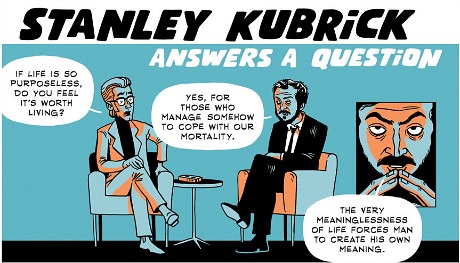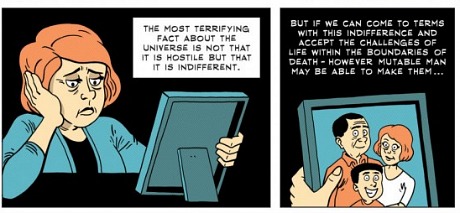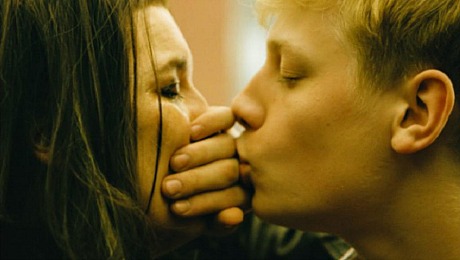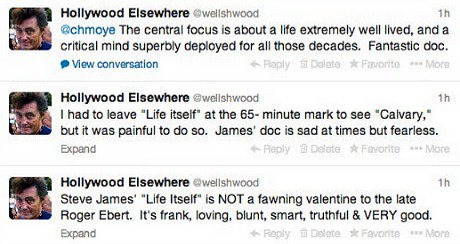
 Jeffrey Wells
Jeffrey Wells
Last Significant Cannes Screening
Starting in exactly 30 minutes (and I’m still at my desk): Olivier Assayas‘s Clouds of Sils Maria avec Juliette Binoche, Kristen Stewart and Chloe Grace Moretz. Boilerplate Wiki synopsis: “Maria Enders (Binoche) has a successful acting career and a loyal assistant (Stewart) but when a young actress (Moretz) interprets a role in a new movie — the same role which made Enders famous — her world starts to crumble. Haunted by her past life, she withdraws along with her assistant to the Swiss town of Sils Maria.” And this, presumably, is what the movie’s about — i.e., to live or to hide away and die. It had better not be about Binoche sitting around and moaning — just saying.
Walkout Club
“The festival is often criticized for its allegiance to established auteurs, a loyalty that leads to sighs of familiarity and worse, especially when it comes to work like Still the Water, the latest from another Cannes regular, Naomi Kawase, which opens with a man slitting a goat’s neck. I left after an hour of empty landscapes, talk and the sight of a second goat having its neck slit.” — N.Y. Times critic Manohla Dargis in her latest Cannes report. For years I’ve been getting roasted in this space for my occasional walkouts. “How dare you?,” “You call yourself a critic?,” “You have to see the whole thing!,” etc. But everyone does it from time to time, and there’s nothing dicey about saying “I saw this much of a given film and then I bailed, but here’s what I thought about the portion that I saw.” In my own small way perhaps I’ve helped to make the world a bit safer for those who wish to write this.
Leviathan Crushes It — Almost Certain to Win Palme d’Or
Well, that tip I got the other night about Andrey Zvagintsev‘s Leviathan turned out to be correct. It’s a drop-dead brilliant, awesomely-composed-in-every-respect melodrama and moral tale that concurrently serves as a microcosm of (or metaphor for) a morally compromised, ruthlessly malevolent, bare-knuckled Russia. Vladimir Putin will love it! (Kidding.) Political corruption, lust and infidelity, way too much vodka, blackmail and thuggery, gunshots, bromide-dispensing priests who kowtow to powerful scumbags, huge whale skeletons, crashing waves, rotting ships — this puppy has it all plus the aura of a majesterial art film plus opening and closing musical passages by Phillip Glass plus the most beautifully lighted, handsomely composed widescreen photography (by Mikhail Krichman) I’ve seen in a long time. And of course, Zvyagintsev, 50, best known for The Return (’03) and Elena (’11), is the grand maestro extraordinaire. And the acting — Elena Lyadova, Vladimir Vdovichenkov, Dmitri Seleznev, Aleksey Serebryakov, Anna Ukolova — isn’t “acting” but rooted, rock-solid behavior that kicks ass all the way around the block and back to your driveway. The consensus inside the Salle Debussy lobby among a few select critics was that Leviathan, a home run if I’ve ever seen one, is a very likely candidate to win the Palme d’Or. It just delivers on all fronts to such an impressive degree…I don’t see how the jury can deny it.

Moonlight Bauble?
Set in the South of France in the 1920s, Woody Allen‘s Magic in the Moonlight is “about a debunker (Colin Firth) brought in to help unmask a possible psychic swindler (Emma Stone)…complications ensue…a backdrop of wealthy mansions, the Côte d’Azur, jazz joints and fashionable spots for the wealthy of the Jazz Age,” etc. The atmospheric aroma of Midnight in Paris meets A Midsummer Night’s Sex Comedy meets the Houdini vs. Margery the Medium dispute? Firth needs to be in something good. The Sony Pictures Classics release opens on 7.25.14.
“Words of Wisdom, Lloyd…”
I first read this Zen Pencils comic-book illustrated piece called “Stanley Kubrick Answers A Question“…what, three or four days ago? But the quote comes from a 1968 Playboy interview Kubrick gave soon after the release of 2001: A Space Odyssey so what difference does it make? Kubrick’s response to the shadow of hovering death and the general meaningless of scrambling around for fulfillment on this speck of matter isn’t earth-shattering, but it’s one the most sensible I’ve ever read. LexG would do well to take heed. Ditto anyone going through a dark patch.


Mommy is A Hyper Hand Grenade
Xavier Dolan‘s Mommy is, for me, the third levitational flick of the 2014 Cannes Film Festival, the other two being Damian Szifron‘s Wild Tales and David Cronenberg‘s Maps to the Stars. That said, the first 50 minutes of Mommy is punishment — assaultive, infuriating, occasionally amusing but more often lemme-outta-here. But I could tell toward the end of my session with this boxy-is-beautiful psychodrama (which I was only able to watch for 75 minutes due to an appointment I was honor-bound to keep) that Dolan had gotten hold of something that was not only focused and working but was slowly building into something more. I didn’t “like” watching much of it, but Mommy is an eye-opener — a movie like no other I’ve seen during this festival. No apologies, full throttle, very few shadings…exclamation!

Mommy costars Anne Dorval, Antoine-Olivier Pilon.
I’m still no Dolan fan (Heartbeats, his second film which I saw here four years ago, sounded the first warning) and his general off-screen rep is that he’s a bit of a histrionic handful. But when I read a line from a review by Hollywood Reporter critic Stephen Dalton that “The Ego has landed,” I knew I had to submit myself.
Loach Isn’t Necessarily Retiring
British director Ken Loach said during a Cannes press conference this morning that he’s not necessarily retiring, which is good to hear. I don’t know what to say about Jimmy’s Hall, his latest film which screened early this morning. It’s a Loach thing through and through, of course — mid-tempo, working-class, earnest, low-key, authentic, political. But it’s a bit of a shrugger. It’s just a no-frills, true-life drama about Irish rabble-rouser Jimmy Gralton upon returning to his native home after more than 20 years spent in the U.S., his conflicts with conservative forces who feared the possible igniting of a leftist movement, and Gralton’s subsequent deportation back to the U.S. There are vague echoes, of course, of today’s 1% vs. 99% equation, and a refrain of the old rule about dissidents always dealing with struggle and adversity. The painterly textures and atmosphere are what moved me the most. I miss the visual splendors of rural, old-time Ireland (the small-village architecture, the browns and greens, the candle-glow lighting) that Loach has often captured in his films, and which are exquisitely presented here. He shot it on that dying technological format known as celluloid.
Downslope
I’m starting to disengage on this, the ninth day of the 2014 Cannes Film Festival. Every longish festival (10 or 11 days) starts to run out of gas after the sixth or seventh day, and after that you think more and more about getting the hell out of Dodge. Ken Loach‘s Jimmy’s Hall (modest expectations) screens an hour from now at 8:30 am, followed by Rolf de Heer‘s Charlie’s Country (starring famed Aboriginal actor David Gulpilil, known for his performances in Walkabout, Crocodile Dundee, Rabbit Proof Fence and Australia) at 11 am. The annual outdoor lunch at the top of Le Suquet (i.e, Old Town) runs from 1:30 to 3 pm, and then the 7pm showing of Leviathan followed by Asia Argento‘s Incompresa, an Un Certain Regard selection, at 10 pm. Friday seems like an even weaker day with Sils Maria, the Olivier Assayas drama costarring Juliette Binoche, Kristen Stewart and Chloe Moretz, screening at 8:30 am.
Stink of Corruption
A somewhat vested professional woman told me the night before last that Leviathan, the latest film from Russian director Andrey Zvyagintsev, is quite essential. She claimed this endorsement was relatively unaffected by her business interests. It screens this evening at the Salle Debussy and Salle Bazin at 7 pm and 9:30 pm, respectively. The Wiki page says it’s “about a man who struggles against a corrupt mayor,” and is “a modern reworking of the Book of Job…a story of love and tragedy experienced by ordinary people.” Something in me flinches when I hear that term, “ordinary people.”



